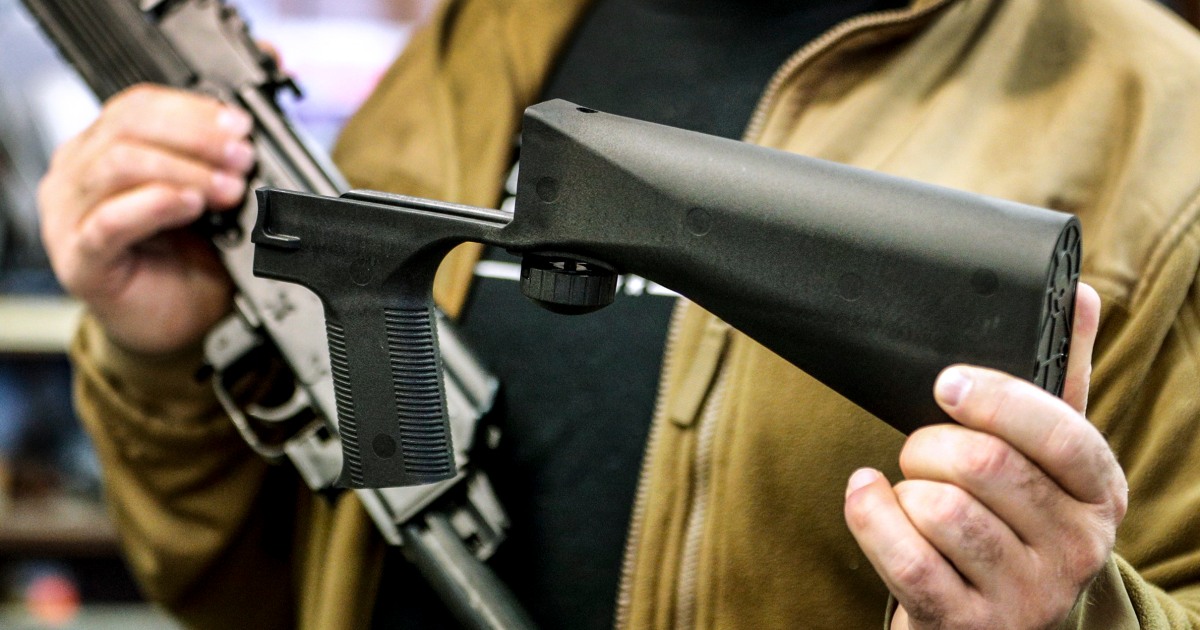 [ad_1]
[ad_1]
Is a “bump stock” a “machine gun”? That’s the query for the Supreme Court at oral argument Wednesday morning. How the justices reply might have huge implications for regulation enforcement, public security and prison punishment.
Although it’s a gun case at a courtroom that has drastically expanded the Second Amendment, this newest enchantment doesn’t ask them to interpret that modification. Reasonably, it includes how federal law defines machine guns. Bump stocks are gadgets that connect to semi-automatic rifles, enabling fast fireplace. After the deadly mass shooting in Las Vegas in 2017, the Bureau of Alcohol, Tobacco, Firearms and Explosives under the Trump administration stated the gadgets meet the machine gun definition.
The fifth U.S. Circuit Court docket of Appeals disagreed. The circuit courtroom stated that a “plain reading” of the statutory language, coupled with the mechanics of semi-automatic firearms, excludes bump shares. The appeals courtroom additionally stated the query is a minimum of ambiguous, main it to use one thing known as the rule of “lenity,” which construes ambiguous legal guidelines that expose individuals to prison legal responsibility in favor of people moderately than the federal government.
The Biden administration appealed to the justices, telling them that if the circuit ruling stands, “its consequences are likely to reverberate nationwide,” deeming the difficulty one which’s “exceptionally important for federal law enforcement and public safety.” Amongst these backing the federal government is a coalition of gun security teams, who explain that bump shares “turn semi-automatic rifles into machineguns. That is their sole purpose.” If the justices don’t reverse the fifth Circuit, the teams write, “it will make every American less safe.”
Among those backing the person on the heart of the case, gun supplier Michael Cargill, are the National Rifle Association and the Nationwide Affiliation of Legal Protection Attorneys. The latter group stresses to the justices that the rule of lenity “deserves strengthening and clarification as a bulwark of civil rights protections in our federal republic.”
So whereas Wednesday’s listening to could characteristic technical dialogue about how precisely bump shares work, all agree the ramifications are weighty.
Notably, slated to argue towards the Trump-era bump inventory ban is Jonathan Mitchell, who took the lectern for Donald Trump himself earlier this month within the ballot eligibility case that’s nonetheless awaiting choice. Earlier this time period, the justices individually heard argument in a Second Modification case, United States v. Rahimi, through which we’re awaiting a ruling as effectively.
At issue in multiple cases this term is the scope of federal agency power. On this case, the bump inventory ban stems from an ATF regulation, moderately than an act of Congress. This newest enchantment, Garland v. Cargill, supplies one more vital matter affecting the nation for the excessive courtroom to resolve this time period, which usually sees closing choices come by late June.
Subscribe to the Deadline: Legal Newsletter for weekly updates on the highest authorized tales, together with information from the Supreme Court docket, the Donald Trump instances and extra.



